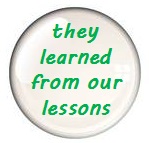In the last few posts we've been exploring what's wrong with the way we position "lessons learned". In part one, we looked at the passive problem of people's tendency to focus on the lessons rather than the activity of learning. In part two, we looked at the negative associations of the term 'lessons', and the impact that this can have. In part three, I want to look at the problem of ambiguity.
The label "lessons learned" trips off the tongue easily, but that doesn't mean that everybody hears it in the same way. Learning appears in more than one place on an learning loop, so there is plenty of room here for confusion. It can be an output, an input, or an agent of change. Here is one, very simple question you can ask to check whats going on in your lessons learned process.
Who is learning?
Here are potential three recipients of the learning - let's imagine we give a badge of recognition in each case:
It could be person or team who had the experience, who completed the activity and then reflected upon it.
In this case, learning is an output.
It could be a function or department who learn from a team's experience and make a change to a process, policy, standard or working practice - thereby reducing the risk or improving the prospects for everyone who follows. In this case, learning is an agent of change to the structural capital of the organisation. It becomes an embedded inheritance for all who follow.
It could be another team about to commence a new activity who are learning from the experience of a previous team. In this case, learning is an input. This input could proactively pushed to another team, or pulled by the new team, through a peer assist, for example.
It's important to recognise that all of of these are valid and desirable outcomes , or there's a danger that we allow learning from lessons to be a slightly self-indulgent team huddle. Worse still, we focus on building the library of lessons rather than actioning the change that the learning should produce, see my earlier shaggy dog story about selling a BMW.
MAKE award winners ConocoPhillips and Syngenta both recognise the need to lubricate all parts of the learning and sharing cycle with appropriate senior recognition.
ConocoPhillips have their 4G awards: Give (sharing knowledge), Grab (applying someone else's knowledge), Gather (consolidating knowledge), Guts (sharing learning from failure).
Agri-business Syngenta loved this, and created their own TREE awards along very similar lines: Transfer, Re-use, Embed and [share a difficult] Experience.
In each case, senior leaders are involved in judging and celebrating the best examples of these essential behaviours, and the teams or individuals concerned receive a physical recognition award. It's very clear who is learning, who is sharing, what is improving and where the value is - all of which is the best antidote for ambiguity.




